Jake Ridley, CFP®
A Great American Tragedy?
Is the American dream of retirement actually a tragedy? In John Piper’s famous sermon, “Don’t Waste Your Life” (video below) he laments about a Reader’s Digest story of “Bob and Penny”. Bob and Penny were a couple who spent their retirement days in Florida cruising on their thirty-foot trawler, playing softball, and collecting shells.
At the climax of Piper’s story, he places them in front of the Lord to give an account of their life. And what did Bob and Penny present to the Lord as proof of a life well-lived? A shell collection, a nice golf swing, and a boat – a tragedy according to Piper. Is he wrong? Is this retirement “dream” really a nightmare? Is it even okay for a Christian to retire and (gasp) plan for it? (Disclaimer: I’m hoping for the latter or I’m out of a job.)
Let’s unpack this by looking at how “retirement” has evolved and what the Bible has to say about it.
The American “Retirement”
The American version of retirement is a relatively recent phenomenon. A combination of urbanization via the industrial revolution, increased life expectancy, and increased wealth has led the current retirement iteration.
According to the chart below, the first big shift in retirement (worldwide) happened around 1880. As the world shifted from an agricultural to an industrial society, factories hired younger workers. By the 1920’s, older workers were not as valuable as younger workers, leaving them financially exposed: “Many firms began to prohibit or restrict the hire of new workers older than forty-five or fifty. In his ruling on Social Security Supreme Court Justice Cardozo cited a study reporting that, in 1930, “out of 224 American factories investigated, 71, or almost one third, had fixed maximum hiring age limits; in four plants the limit was under 40; in 41 it was under 46. In the other 153 plants there were no fixed limits, but in practice few were hired if they were over 50 years of age.”
Younger workers were a better investment (in the factory’s eyes) due to their better physical capabilities and longer employment potential. This left older workers vulnerable, hence the introduction of Social Security.
In short, society became concerned about the welfare of older workers and wanted to ensure they lived their final years with dignity.
As America became wealthier and life expectancies increased, though, this retirement concept slowly shifted from being about survival to enjoyment. By the 1950’s “retirement” meant a period of ceasing from work to enjoy recreational activities and by the 80’s was firmly cemented as a time to plan for and look forward to.
Does the Bible Talk About Retirement?
Historically, the American version of retirement is a relatively recent thing. But what does the Bible have to say about it?
Retiring Levites
The only true mention of the word “retirement” comes in Numbers. For my money, Numbers ranks at the top of hardest to read books of the Bible (slightly edging out Leviticus and Chronicles). So, I wouldn’t fault you for not noticing this example before. But, right here in Numbers 8:24-26, God makes a provision for the Levites to retire at fifty.
Why fifty? It doesn’t explicitly say. But there seems to be at least some practical reason. Levites had a hard job. They were responsible for moving and setting up the tabernacle, processing grain, butchering animals – hard, physical work. Fifty was close to the average life expectancy of that time.
Basically, it would be hard for an older Levite to keep up with the physical demands of the job. So, God allows them to retire. Also note, “retire” doesn’t mean “quit”. They are still able to “assist their brothers”, likely providing guidance and wisdom. The older Levites were just not responsible for physical labor.
So, here we have a place where God allows for the ceasing of active, physical work with the option to work a less strenuous physical job. That sounds pretty reasonable to me. But does this Levite “retirement” really represent the American “retirement” that is advertised today?
The Parable of the Rich Fool
One of the most famous passages of storing up wealth solely to use purely for leisure (i.e., today’s retirement) is the ‘Parable of the Rich Fool’ in Luke 12:13-21.
Why is this guy considered a “fool”? First, he was “greedy”, not realizing that life is not about “possessions” providing one with comfort and ease. Then, he took his newfound prosperity and used it to make life all about himself. His surplus of grain was going to be put to good use (in his eyes) by giving him the ability to finally “eat, drink, and be merry”.
Unfortunately, he didn’t realize that he would stand in front of God that night as his life would be “demanded” of him, leaving all he had accumulated to someone else. Jesus summarizes his poor plight by saying “a person is a fool to store up treasures for himself but is not rich toward God”.
In summary, he used all his wealth for himself. There are 13 personal pronouns “I, me, mine” in this parable. It was all about him – enjoying what he built all for himself.
On a related note, you definitely don’t want to be standing outside during a thunderstorm while you ponder all you have accomplished. Just check with Nebuchadnezzar (Daniel 4:30) or Herod Agrippa (Acts 12:22-23), or this poor guy.
What did he gain from this? Well, he died that night. He then found himself face to face with God. And the only thing he had to show for his life were some full-to-the-brim storehouses – meant only for him. Sound familiar?
This parable is a clear indictment on the retirement advertised today – a time to finally live for “me”. But does it condemn all retirement? I don’t think so.
How to Have a Truly Fulfilling Retirement
Here’s where we are: The Bible allowed retirement for Levites. But “retirement” really meant a change in duties. Their physically taxing duties changed into more of an advisory role, like providing guidance and wisdom. However, the “American Dream” version of retirement – when I finally get to live for me – is clearly not God’s plan, hence the Parable of the Fool. So, how do you have a true God-honoring retirement?
Here’s the foundational principle: God will continue to use you and your gifts to care for his creation, whether working or retired. The type of work required to accomplish this will change, but the goal remains the same. Can that involve travel and leisure? Absolutely. I’m not preaching the poverty gospel. Should it solely revolve around that? No. Should it include providing biblical wisdom, mentorship, discipleship. Yes. Some of my greatest influences were able to meet with me at lunch or breakfast because they were “retired”.
If you aren’t retired yet, begin thinking and praying about how God will continue to use you. Meet with others who have retired and are still being used by God. If you’re already retired, think of ways to do this today. Below are a few examples that I’ve personally seen over the years.
- Discipling young men/women.
- Discipling and loving your Grandkids.
- Providing vacations for your family.
- Hosting a small group.
- Elder of a church plant.
- Become a staff member at a church plant.
- Providing wisdom and guidance to young pastors.
- On staff at an evangelism mobilization organization.
- Serve on a church board.
- Serve on a non-profit board.
- Serve on a for profit board.
- Start a business.
- Become a missionary.
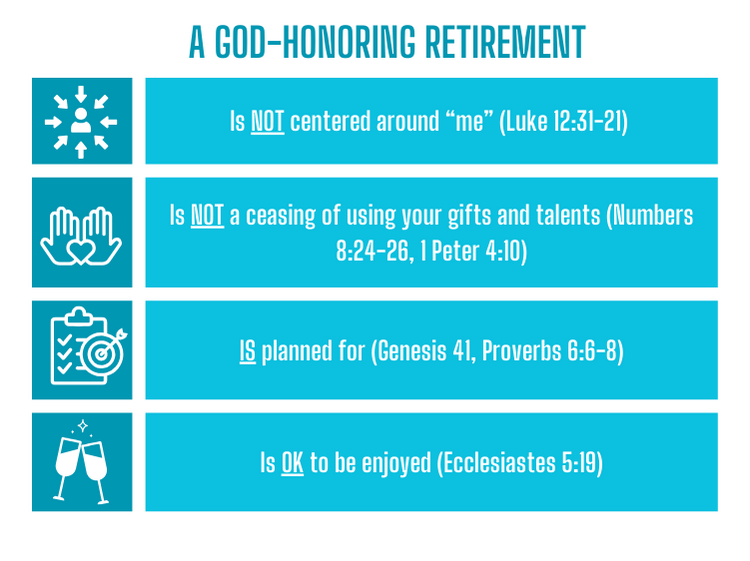
Planning for Retirement is Biblical
So far, we’ve established that God – in one example – provides an explicit command for retirement. But Jesus makes it clear that there’s more to life than accumulating things only for yourself. He calls this “greed”. One check mark for practical retirement and one against the traditional “American Dream” retirement.
Is it okay, then, to plan for retirement by saving? Yes. There are several positive examples of planning for the future. Through Joseph’s wisdom and planning in Genesis 41 many people were saved. He did this by storing up grain while the harvest was plentiful to use in the eventual years where no crop could be produced. The ant is praised in Proverbs 6:6-8 for storing up food (not consuming) during the summer harvest so that he has something to eat in the winter.
Likewise, we should save some of our fruits from productive years to use in our less productive years.
“But wait”, I’ve heard some say, “isn’t this a lack of faith in God to provide in the future?”
No, it’s not a lack of faith. It’s good planning.
Here’s another way to look at it: Most people get paid once or twice per month. But I have yet to meet a person that gets paid on Monday, spends everything by Monday night, and then expects God to provide until the next paycheck. We would call this foolish, not faith filled. Saving for retirement is the same thing, just extended out by years rather than days. By saving for retirement, you are simply delaying consumption, like Joseph and the ant.
Saving for retirement does not show a lack of faith, it shows prudent planning.

Wrapping Up
Retirement has become a loaded word. Some Christians see it as complete anathema and some have fully embraced the American retirement dream. But both are wrong.
Those that swear it off thinking they will be just as productive at 80 as they were at 35 (I’m going to work forever!) are naïve. However, the retirement marketed to us Americans (you can finally live for you!) is also wrong. We were created to serve others (remember the greatest commandment?).
Retirement certainly doesn’t mean God is done using you. Some of the most impactful people in my life were retired. Their wisdom, life-experience, and availability were true, life-changing blessings. And enjoying retirement (travel, grandkids, leisure) is also not bad. Just like it’s not all bad in your working years. It just shouldn’t be the purpose of retirement.
A true, fulfilling retirement has to involve the love of others – just like pre-retirement life. That’s how God has designed life. So, continue to fulfill God’s calling for your life in retirement, just as you did in your working years.
Disclosure: The views expressed in this article are those of the author as an individual and do not necessarily reflect the views of the author’s employer Astoria Strategic Wealth, Inc. The research included and/or linked in the article is for informational and illustrative purposes. Past performance is no guarantee of future results. Performance reported gross of fees. You cannot invest in an index. The author may have money invested in funds mentioned in this article. This post is educational in nature and does not constitute investment advice. Please see an investment professional to discuss your particular circumstances.
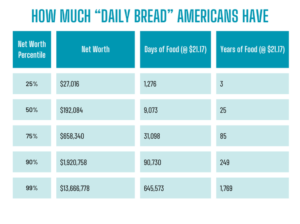
“Give Us This Day Our Daily Bread” …But What If You’re Rich?
Most Americans have 25 years of “daily bread” stored up in their accounts. So, what does it actually mean for us to pray for “daily bread”?
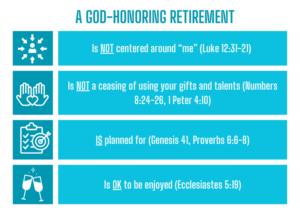
Is Retirement Biblical?
Is the American dream of retirement actually a tragedy? Let’s look at what the Bible has to say about it.

Don’t Let a Good Year Go to Waste
Don’t take it for granted when your investment fortitude pays off. Store it in your memory bank and build that resilience muscle for when (not if) the next downturn comes.

Why I’m a Fee-Only Advisor in Round Rock
Why I am a fee-only advisor in Round Rock, Texas (the best town in America).

An Incredible, Unsung Story of Generosity [Acts 11:29-30]
These two verses in Acts describe one of the most inspiring stories of generosity in the Bible.
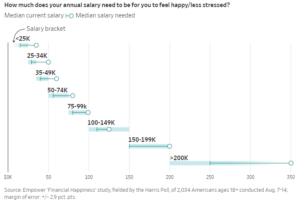
Can a Christian Enjoy Money? [A Discussion of Ecclesiastes 5:19]
Can a Christian enjoy money? Much has been (rightly) written about the dangers of money. But what about enjoying money?
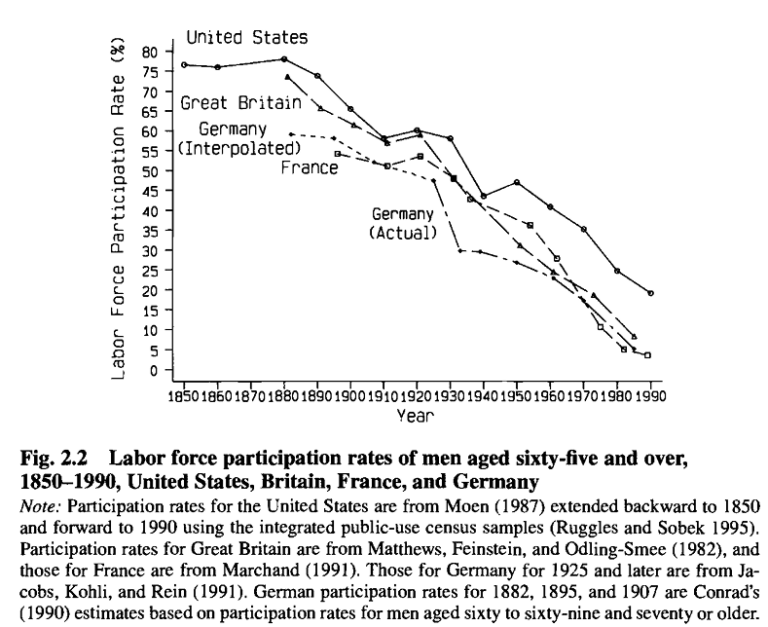
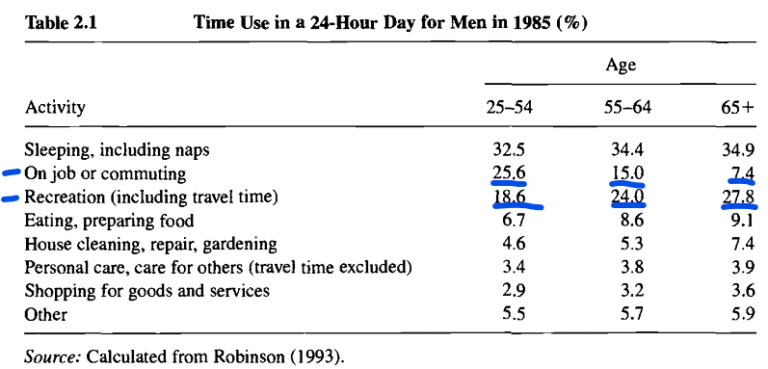


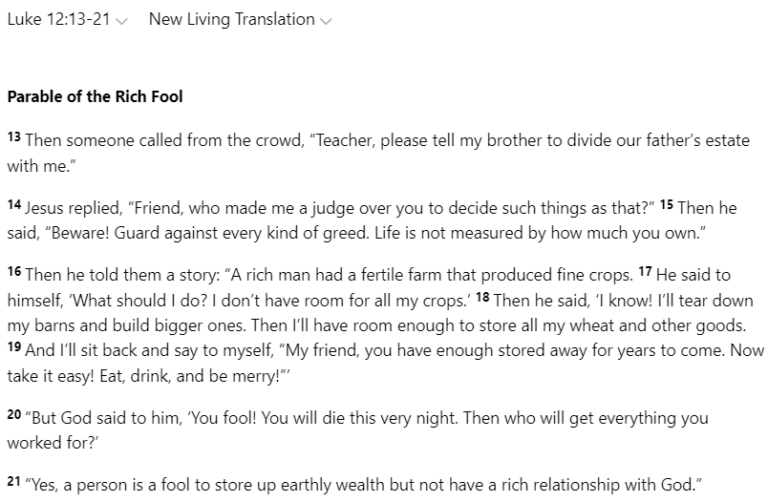

Pingback: Don’t Let a Good Year Go to Waste - Church Fiduciary
Pingback: CDs are 5% – Why Risk Investing in the Market? - Church Fiduciary
Pingback: How to Invest if You Are Worried About America’s Future - Church Fiduciary